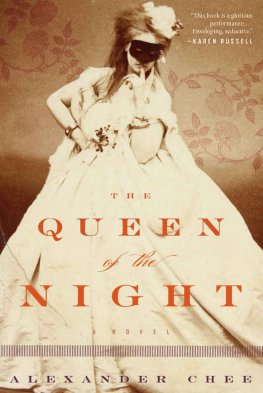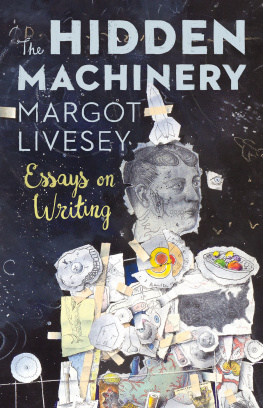Copyright 2018 by Alexander Chee
All rights reserved
For information about permission to reproduce selections from this book, write to or to Permissions, Houghton Mifflin Harcourt Publishing Company, 3 Park Avenue, 19th Floor, New York, New York 10016.
hmhco.com
Library of Congress Cataloging-in-Publication Data is available.
ISBN 978-1-328-76452-2
Cover design by Christopher Moisan
Front and inside cover photographs courtesy of the author
Author photograph M. Sharkey
e ISBN 978-1-328-76441-6
v1.0318
To my mother and father, who taught me how to fight
The Curse
I SPENT THE SUMMER I turned fifteen on an exchange program in Tuxtla Gutirrez, the capital of the state of Chiapas, in Mexico, some three hundred miles north of the Guatemalan border. My host family was named Gutirrez, and I never asked them if the town took its name from their forebears, but if it did, they wore their fame lightly, though they were a powerful and prosperous family. The father, Fernando, had been a stevedore, of the kind who worked for him now, and the mother, Cela (pronounced Che-la), was a dance teacher. They lived like people who felt lucky to be alive, and I loved them right away.
Their son, Miguel ngel, had lived the previous year with me and my family in Cape Elizabeth, Maine. He had told his parents stories of me, and so they greeted me like a child theyd always known but never met. They had a handsome modern house of gleaming wood, glass, and stucco, surrounded by high walls topped with barbed wire and trees with enormous crowns, their leaves arrayed in stars, that I would learn were mangoes.
The first night, the family told me over a cheerful and friendly dinner that they were not going to speak to me in English for the rest of the summer, no matter how confusing it was. And that this was to teach me to speak Spanish. I laughed as I agreed, in Spanish, to their terms, intimidated but sure of my purpose and already wanting to please them.
That night, as I lay awake trying to sleep, I heard the knock of ripe mangoes falling from the trees that circled the house and ran up and down the street. The noise ranged, depending on the ripeness, from the plop of a tennis ball to a pulpy sort of splash to the occasional smash when one of them would crash through a car windshield.
We need to cut that tree down, my host mother said the next morning. She would say it whenever this happened, but they never did. It was as if they accepted the broken windshields as the price of the mangoes, which we ate as fast as we could. They had their gardener collect the fruit instead, and replaced the windshields as if they were changing a tablecloth. And that would be among the first of my object lessons in the ways of the very rich.
Years later, and only when I learned of the deep poverty in Chiapasthe reason they had those walls topped with barbed wiredid I think to question whether it was really just mangoes breaking their windshieldsif mango season lasted as long as a summer.

I WAS ONE OF twelve students in Chiapas from my high school that summer, on what now seems like an odd program: we lived there with the Mexican students who lived with us during the year, but unlike them, we did not attend any classes. The summer itself was supposed to be a class. If my host family had not made me promise never to speak English, I dont know what I would have learned. Our teacher came with us, as a chaperone, but he did not teach us. Whatever else he did there, he also accompanied us on intermittent group field trips to explore the mostly well-trodden ruins and to shop in places like the nearby San Cristbal de las Casas, formerly the capital of Mexico, a quiet, sun-struck city, cheated out of the prosperity of being the capital. These trips were set apart for me by stretches of nameless, numberless days spent wandering the empty, luxurious house while the Gutirrezes were either at school or at work. I was fascinated by my host fathers many toupees, which were kept on mannequin heads in his bedroom dressing room, and the life they suggested, entirely alien, of hair that was public and hair that was private.
It was just one detail of many that I eagerly collected that summer, and if it seems I was snooping, I was. I was lost in the books I had brought with me, the Dune novels by Frank Herbertthe story of a young boy without playmates, suspected of being a messianic figure, and undergoing training in the ways of the Bene Gesserit, a secretive society of women with extraordinary powers, born in part through their obsessive observation of detail. The boy was the latest iteration of a series of heroes like this for meEncyclopedia Brown, Sherlock Holmes, Batmanwho went from being ordinary people to heroes through their ability to perceive the things others missed. I wanted to see if I too could obtain these powers through observation.
And when I wasnt reading those novels, I wrote my own stories, stories no one has seen to this day, about mutants with psychic powers who were running from a government that, of course, hoped to control them. X-Men fan fiction, essentially, before I knew what it was.
It was my greatest dream to live out this kind of story, of power gained through either inborn abilities or persistence, and though I couldnt have said this at the time, this dream coming true would have meant all of my struggles were worth it.
The closest thing I had to a routine that summer was my time spent sitting with the cook, Panchita, in front of the kitchen television, chomping on the fried tortillas she served me, spread with some sort of light, fresh tomato sauce and sprinkled with white cheese. Together we watched El Maleficio, a telenovela about a wealthy family of witches living in Oaxaca and the various troubles they got into. I liked the look of that soap opera, those men and women who seemed straight out of Dallas or Falcon Crest all shouting at each other, casting spells, promising revenge, and lit by the cheesy special effects that made their already spectral appearance even more incredible. I couldnt understand most of what was being said at first, having had just two years of high school Spanish before this. But about a month into my stay, while watching the show, I had the realization that I understood everything the witches were saying. The ads came on and I understood those also. The news came on and I understood that as well. It was as if the show had cast a spell on me.
I had crossed over into fluency. I said something to that effect to Panchita, and she smiled and laughed, congratulating me. She herself spoke only a little more Spanish than me, she joked, and made me the treat of an extra tortilla that day.
MY HOST BROTHER, MIGUEL ngel, snorted almost nightly at the unfairness of my program when he came home from summer school to find me tanned and reading. He was a tall, lanky seventeen-year-old with a sort of dreamy teen-idol beauty gone slightly, if adorably, awry. He had large front teeth that were endearingly crooked, and he wore the tightest, thinnest jeans of anyone I knew, his hair cut in a Leif Garrett shag. At some point after arriving home from school, Miguel would begin getting ready for the evening, showering and dressing carefully for the disco. I found these preparations alien and thrillingthe application of cologne being nearly mystical to watch.
















